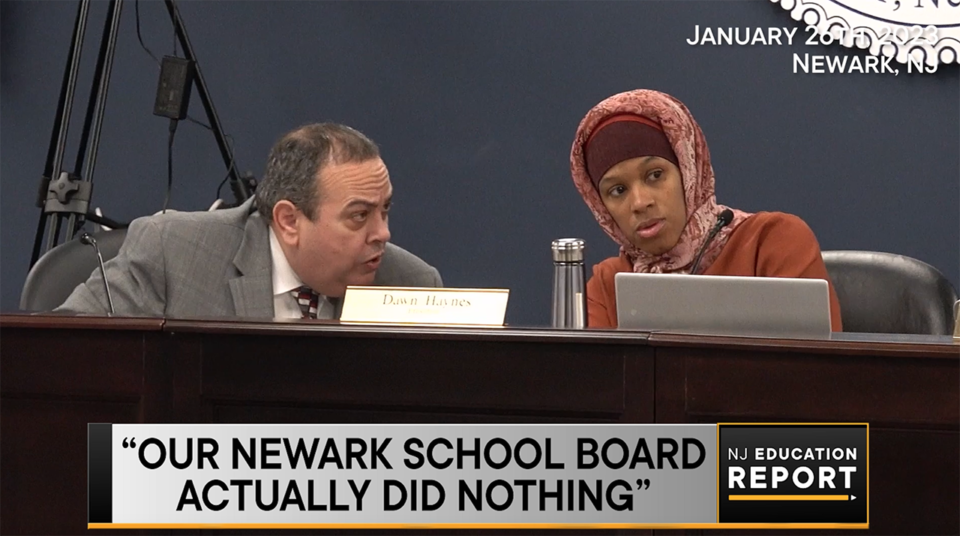
New Jersey Teachers Union PAC Unanimously Support the LD16 Democratic Slate
April 27, 2023
HOGAN: Our Jersey City Public Charter Is One Of the Most Diverse Schools—And Here’s How We Got There
April 28, 2023Murphy vs. Christie: When Education Politics Works for Kids—and When it Doesn’t
Public education, by definition, is political. After all, the Greek word polis refers to forms of power relations among individuals and city-states; when you’re dealing with top-down institutions paid for by tax dollars, there’s no avoiding the stench.
Yet we can make a distinction between education politics and policies that benefit students and those that hurt students.
A quick glance at yesterday’s headlines shows we’re not getting the balance right:
- AFT President Randi Weingarten testified before a U.S. Senate subcommittee on school closures during COVID-19. Legislators accused her of colluding with the Centers for Disease Control to keep schools shuttered and Weingarten responded by trashing the Trump Administration. How does this political theater help kids?
- The Wall Street Journal reports on the trend of “equitable grading,” which has led to “gaming the system and a lack of accountability,” say students and teachers. Does twisting equity into an excuse for lowering standards benefit kids?
- A Washington school district is cutting its music program because it promotes “white supremacy culture” and “significant institutional violence.” Now, yes, I’m a total Bach nerd but there’s so much data showing learning music facilitates learning in other subjects. Wrong call, guys.
Let’s narrow our lens to New Jersey. When I think about getting the politics of education right, I harken back to what former Education Commissioner Chris Cerf told me in an interview.:
There are the interests of children, the interests of employees — which are perfectly legitimate — the interests of commercial outfits like vendors and publishers. The great myth of public education is that the circles of this Venn diagram neatly converge, one concentric circle over another, but the truth is there are so many ways that the circles fail to overlap. My duty, that I hope has guided everything I do in this space, is to break the tie in favor of children, largely because they have no other advocate.
That’s my litmus test for education politics: does it break the tie for or against children?
So let’s contrast the Christie and Murphy Administrations.
I have plenty of shade to throw on Chris Christie, including his needless bullying of NJEA, but I think he got education right most of the time.
On the other hand, while I support Gov. Phil Murphy’s stance on many social issues, I think his education politics too often breaks the tie in favor of adults.
Let’s do a compare-and-contrast:
You can tell a lot about a leader by the deputies they appoint. (Leo Rosten: “First-rate people hire first-rate people; second-rate people hire third-rate people.”)
Christie appointed education commissioners who ran tight ships, raised standards, were committed to social justice and equity, and made student learning their top priority: Chris Cerf, David Hespe, Kimberly Harrington. (Okay, Bret Schundler was blamed for the Race to the Top screw-up but someone needed to be the fall guy.)
Murphy has chosen commissioners who consistently break the tie in favor of adults, especially those who delight in culture wars. His first commissioner, Lamont Repollet, was famous for the scheme he orchestrated in Asbury Park called the 64 Floor, which makes it impossible for teachers to give students a grade below 64, even telling a Senate committee that inflating grades and graduation rates is a manifestation of “equity.” Then, when COVID-19 closed schools, he issued what superintendents called “lazy” and “incomplete” guidance that left them flailing.
Does Repollet’s political philosophy break the tie in favor of children? Let’s ask Asbury Park High School graduates, of whom three out of four (using the most recent pre-pandemic year) aren’t enrolled in any post-secondary program a year after picking up their diploma.
This is not breaking the tie in favor of children.
Murphy’s next pick, Angelica Allen-McMillan, seems unable to look beyond culture wars. During her tenure she’s had her staff focus on redefining gender identity instruction and equating “equity” with “equal outcomes;” changed the meaning of a high school diploma to “high school graduation ready” instead of “college and career ready;” ignored the staggering learning loss endured by students; and delayed the release of last spring’s standardized tests so long that Andy Rotherham described it as “fecklessness, irresponsibility, and almost total attention to politics and public relations rather than kids.”
Allen-McMillan is Repollet minus the bluster; her crusade for political-correctness has left students behind.
And we haven’t even gotten to public school choice, which in New Jersey mostly takes the form of wealthier families moving to higher-performing districts and leaves those without financial resources stuck in low-performing schools. Christie supported public charters—often low-income families’ only school choice option— as did his Commissioners, albeit with heavy accountability; Cerf closed ten for poor student outcomes. Repollet danced kabuki with a fake “charter school act review” that never saw the light of day but justified the charter school moratorium Murphy promised NJEA. Allen-McMillan continued the pattern until this past year when Murphy realized he had to move to the middle as he contemplated a presidential run.
Axios reports that Republicans have gained the upper hand over Democrats as they “build a broad coalition centered on frustrations that schools are acting against their kids’ best interests.” Now, some of that is LGBTQ-bashing parading as “parent rights” but a consensus is growing among voters that Democrats are on the wrong path.
I’m a lifelong Democrat, I wish the state and national Party would repair its moral compass and start breaking the tie in favor of children.




